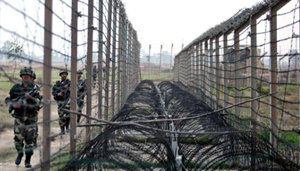New Delhi, Jan 24: An Israel-type highly secured fencing may come up along the Indo-Pak border to check infiltration from across the border as the government is exploring the possibility of installing such a barrier in the sensitive frontiers of Punjab and Jammu.
In the wake of Pathankot terror attack, which was carried out by the Pakistan-based JeM terrorists after crossing the border, the issue of ensuring zero infiltration along the Indo-Pak border was discussed in several meetings attended by top government functionaries, including Home Minister Rajnath Singh and NSA Ajit Doval.
"In one of these meetings, they discussed whether India can adopt an Israel-type border guarding mechanism along the western frontier," a Home Ministry official said.
Interestingly, in November 2014, the Home Minister had visited one of the border outposts in Gaza and was "greatly impressed" by the technology used in the highly sophisticated border security system of Israel which includes high-quality long-range day cameras along with night observation systems employing third generation thermal imagers.
Israeli Prime Minister Benjamin Netanyahu had reportedly told Singh that Israel was "ready and willing" to share with India its technology for border protection.
Israel is hailed to have the best border protection system in the world, and depends more on technology than humans to protect its border.
The technology includes high-quality long-range day cameras along with night observation systems, third generation thermal imagers, long-range detection radars, electronic touch and motion sensors on the fence as well as underground sensors to detect any tunnelling attempts.
The Israeli border fencing along West Bank, Gaza and Egypt also consists of latticed steel, topped and edged with razor wire, extending at least two metres below ground and in some sections reaching seven metres above the ground.
Ditches and observation posts with cameras and antennae will line the route.
An electronic pulse will run through the fence, setting off an alarm on contact that will allow security guards to locate the exact spot of attempted infiltration.
A sandy tracking path shows the footprints of infiltrators and an military patrol road gives unhindered access to army units.
Singh was also given a detailed briefing by the Israeli Army about the border-guarding mechanism put in place.
The Home Minister was told that in certain "dark areas" where fencing was not possible, like on India-Pakistan border as well, Israel had used small UAVs for security coverage.
Besides, every border post on the Israel border is a self-sufficient unit.
Recently, Hungary and Bulgaria have turned to Israel for advice on building a fence modelled on the one set up on the southern Israeli border with Egypt to stop influx of refugees.
The US, India and other countries have sent delegations to Israel in the past to examine the innovations involved in the barrier.





Comments
Add new comment